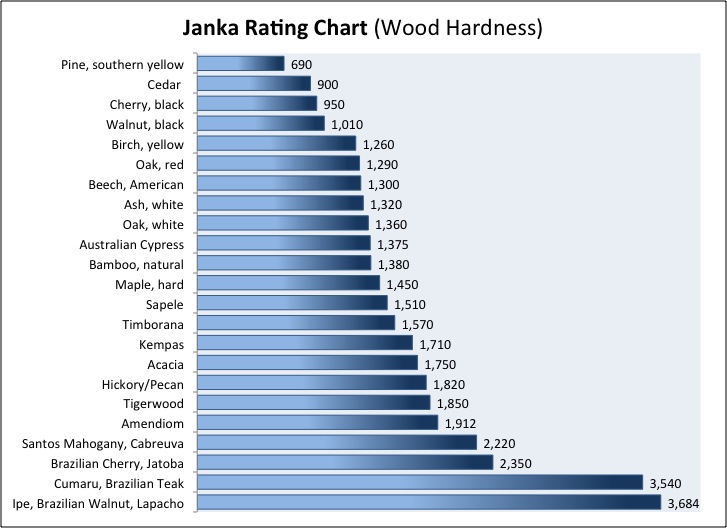We’re often asked which hardwood floors are the most durable.
To answer that question, two items must be considered—the floor’s finish and the wood’s hardness.
The finish is the protection over the bare wood. Finish prevents water from penetrating the wood and provides protection from everyday wear and tear. However, no finish will make the wood underneath it measurably harder.
Each species has a different hardness. Some woods are soft. We often joke that if you look at White Pine the wrong way, it will dent. Other woods are extremely hard, such as species from South America like Ipê.
So you should pick the hardest wood possible, right?
Not necessarily. Each species has other characteristics such as color, grain, and cost that may or may not appeal to you.
How Hard Is Hard Enough for You?
Two questions must be answered to decide on the right wood hardness for your home:
-
How much activity will the floor see?
The more activity you have on your floor, the more likely something will be dropped on it or something really hard will be dragged across it and cause an indentation into the wood.
If the floor is in a room with heavy traffic, such as a kitchen or a hallway, you may want a harder floor.
The same is true in a room where you’ll do a lot of entertaining.
If you have kids or pets, hardness in a floor can really be a virtue!
-
How bothered are you by a ding or dent?
For some people, dings and dents are a problem, and hardness will be important to them. However, many people view a dent in a floor as character. In fact, we are now distressing floors to purposely put dents into them.
Measuring Hardness
Below is a chart of the hardness of various species. Hardness in wood is measured by dropping a small ball onto the piece of wood and determining when the wood will dent. This is called a Janka measurement.

If hardness is important to you, some guidelines to follow are:
-
Species between Hickory and Ipê provide the most dent resistance. In everyday life, you will not see much difference among woods in this section—they’re all hard enough. You’re not dropping a ball on the floor. Your kids are playing in the house.
-
Species between Birch and Hickory represent most of the North American woods. They provide good dent protection and are excellent choices for most families. Grainy woods such as Oak and Ash will hide dents better than other woods. Expect to notice a fair amount of dents from dogs if you select less-grainy woods such as Maple and Birch.
-
Softer woods such as Cherry, Walnut and Pine are good choices if you consider dents to be signs of character or live a lifestyle that won’t result in a lot of activity.
But remember, even if hardness is a significant concern, each species has many factors to consider. Hardness is only of these factors.















